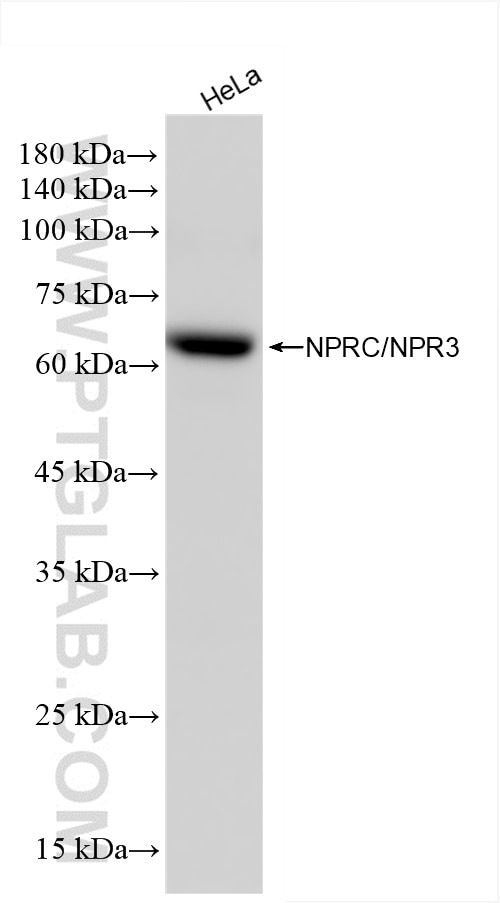Tested Applications
| Positive WB detected in | HeLa cells |
Recommended dilution
| Application | Dilution |
|---|---|
| Western Blot (WB) | WB : 1:1000-1:4000 |
| It is recommended that this reagent should be titrated in each testing system to obtain optimal results. | |
| Sample-dependent, Check data in validation data gallery. | |
Product Information
86206-1-RR targets NPRC/NPR3 in applications and shows reactivity with human samples.
| Tested Reactivity | human |
| Host / Isotype | Rabbit / IgG |
| Class | Recombinant |
| Type | Antibody |
| Immunogen |
CatNo: Eg2988 Product name: Recombinant Human NPRC/NPR3 protein (rFc Tag) Source: mammalian cells-derived, V37 Tag: C-rFc Domain: 27-481 aa of NM_001204375.2 Sequence: GGVGGGGGGAGIGGGRQEREALPPQKIEVLVLLPQDDSYLFSLTRVRPAIEYALRSVEGNGTGRRLLPPGTRFQVAYEDSDCGNRALFSLVDRVAAARGAKPDLILGPVCEYAAAPVARLASHWDLPMLSAGALAAGFQHKDSEYSHLTRVAPAYAKMGEMMLALFRHHHWSRAALVYSDDKLERNCYFTLEGVHEVFQEEGLHTSIYSFDETKDLDLEDIVRNIQASERVVIMCASSDTIRSIMLVAHRHGMTSGDYAFFNIELFNSSSYGDGSWKRGDKHDFEAKQAYSSLQTVTLLRTVKPEFEKFSMEVKSSVEKQGLNMEDYVNMFVEGFHDAILLYVLALHEVLRAGYSKKDGGKIIQQTWNRTFEGIAGQVSIDANGDRYGDFSVIAMTDVEAGTQEVIGDYFGKEGRFEMRPNVKYPWGPLKLRIDENRIVEHTNSSPCKSSGGLEE Predict reactive species |
| Full Name | natriuretic peptide receptor C/guanylate cyclase C (atrionatriuretic peptide receptor C) |
| Calculated Molecular Weight | 60 kDa |
| Observed Molecular Weight | 60-70 kDa |
| GenBank Accession Number | NM_001204375.2 |
| Gene Symbol | NPR3 |
| Gene ID (NCBI) | 4883 |
| Conjugate | Unconjugated |
| Form | Liquid |
| Purification Method | Protein A purification |
| UNIPROT ID | P17342-1 |
| Storage Buffer | PBS with 0.02% sodium azide and 50% glycerol, pH 7.3. |
| Storage Conditions | Store at -20°C. Stable for one year after shipment. Aliquoting is unnecessary for -20oC storage. 20ul sizes contain 0.1% BSA. |
Background Information
Natriuretic peptide receptor C/guanylate cyclase C (atrionatriuretic peptide receptor C), also known as NPR3, is an atrial natriuretic peptide receptor. The family of natriuretic peptides elicit a number of vascular, renal, and endocrine effects that are important in the maintenance of blood pressure and extracellular fluid volume. NPR3 has 3 isoforms with MWs of 37~60 kDa produced by alternative splicing.
Protocols
| Product Specific Protocols | |
|---|---|
| WB protocol for NPRC/NPR3 antibody 86206-1-RR | Download protocol |
| Standard Protocols | |
|---|---|
| Click here to view our Standard Protocols |




